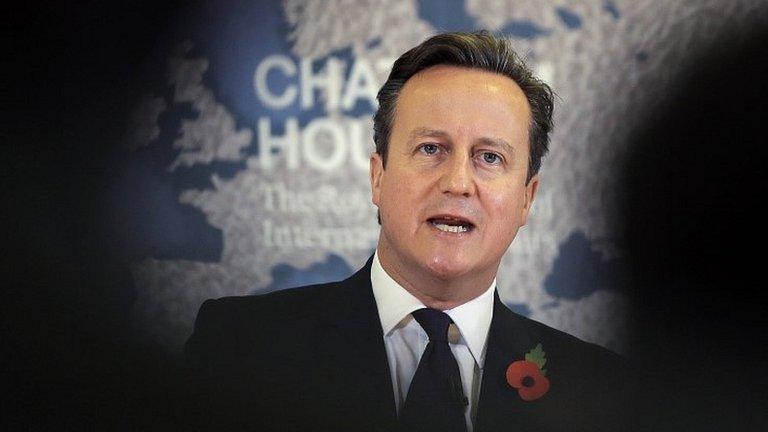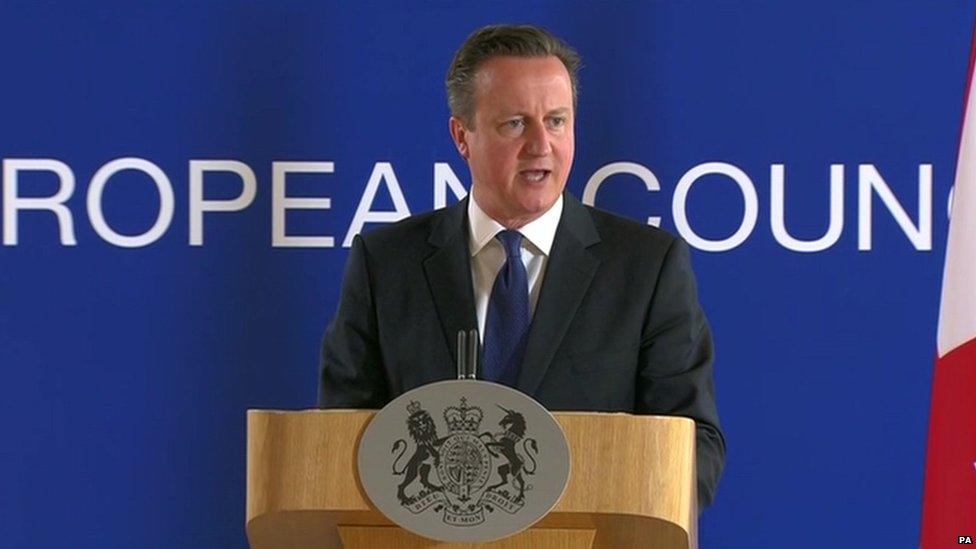EU welfare reforms: Some claimants 'better off with no job'
- Published

Claimants for some in-work benefits could be better off giving up their job temporarily as a consequence of the government's EU negotiations, Whitehall officials have told the BBC.
The PM has made welfare reform one of his key EU demands.
One option under consideration would see all claimants denied in-work benefits unless received unemployment benefit in the previous year.
No 10 said it would "not give a running commentary" on negotiations.
But UKIP leader Nigel Farage, who is campaigning for the UK to leave the European Union, said the idea was "appalling".
Legal restrictions preventing EU citizens from being discriminated against mean ministers are increasingly focusing on ideas that would also prevent thousands of Britons from getting benefits.
Indirect discrimination
Ministers have admitted an EU treaty change will be required to make any major welfare changes.
A document seen by BBC News in the summer from government lawyers to ministers said "imposing additional requirements on EU workers that do not apply to a member state's own workers constitutes direct discrimination which is prohibited under current EU law".
The legal opinion came several months after a speech by David Cameron last November in which he first announced his intention to stop EU migrants from claiming in-work benefits - typically housing benefit and working tax credits - for four years.
BBC News has learned that Whitehall officials were not fully consulted about the legality of the proposal prior to the speech.

In summary: EU negotiations

The prime minister's letter will give greater insight into what he wants from the negotiations
David Cameron says he has a mandate to pursue EU reform following the Conservatives' general election victory.
The PM wants to renegotiate the terms of the UK's membership ahead of an in/out referendum by the end of 2017. He has said he will campaign for Britain to remain in the EU if he gets the reforms he wants.

The legal problems that have emerged are forcing ministers and officials to focus on indirect discrimination - options that disproportionately affect EU migrants but would also impact UK citizens.
One option would see in-work benefits banned from anyone who had not received out-of-work benefits in the previous 12 months.
The proposal could see someone who has worked for many years failing to qualify for support if their income fell because, for example, their employer cut their hours.
'Worse off'
While some exemptions would be introduced, for those leaving education for instance, the scheme would "create an incentive for people to give up work for a little while in order to subsequently qualify for in-work help", said an official.
This option appeals to some ministers as changes already introduced as part of Universal Credit stop EU migrants from claiming out-of-work benefits.
An option BBC News revealed in the summer - a four-year residency test for all benefit claimants - has now been fully costed and is being considered by Treasury officials.
It would mean Britons, even if they had lived in the UK all their lives, would be ineligible for in-work benefits for four years from their 18th birthday.
If implemented, some unemployed British families who failed the test could be thousands of pounds worse off if one of them found a job.
"They would be much better off staying on out-of-work benefits," said a Whitehall official familiar with the proposals.
Benefit tourism
The legality of the proposals is being considered in Whitehall, as are the politics - officials say ministers are wary as both options will affect tens of thousands of British people and could undermine one of the government's central messages, that people should always be better off in work.
A third proposal, which has been floated by the Minister for Government Policy Oliver Letwin, would see in-work benefits denied to people who had not paid enough National Insurance contributions for three years.
That option was seen as being problematic however, said one official, as it would change the nature of Universal Credit and may conversely make EU migrants eligible for out-of-work benefits.
The prime minister remains insistent about getting welfare reform from his EU negotiations, despite officials believing the changes already introduced have tightened the system considerably.
"New EU migrants now face one of the toughest in-work benefit systems in Europe when they come here," said one official.
"We have made benefit tourism a thing of the past," they added.
But Mr Farage said the prime minister's renegotiation strategy was unravelling.
"Even the one area where he was going to go to the European Council and try to get a rule change, actually we've surrendered already by saying we will change the British social security system," he told Radio 4's Today.
"So young couples in this country, aged 21, who work and have got children, will, if this goes ahead, be better off not working than being in work. I think it's appalling."
- Published12 November 2015

- Published11 November 2015

- Published10 November 2015

- Published4 November 2015

- Published11 August 2015
